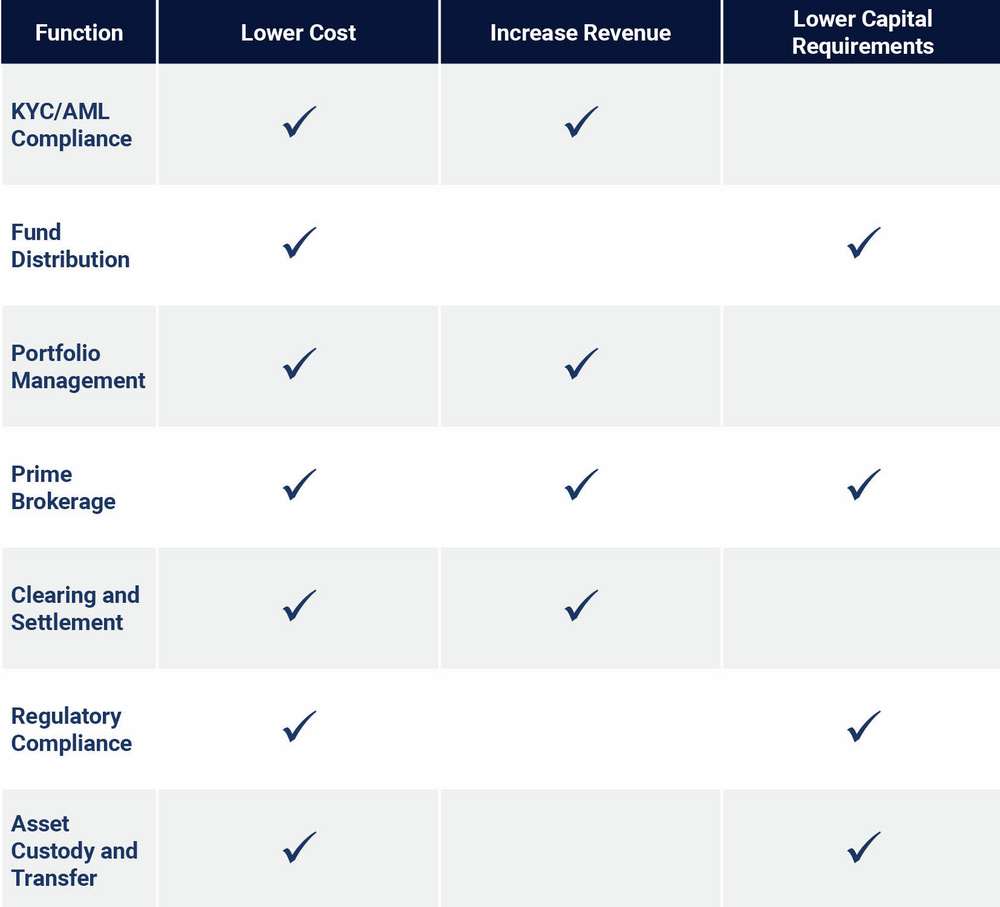Can Blockchain Accelerate Asset Management Industry’s Long-Awaited Disruptions?
Published by Gbaf News
Posted on July 20, 2018
5 min readLast updated: January 21, 2026

Published by Gbaf News
Posted on July 20, 2018
5 min readLast updated: January 21, 2026

Rohit Kulkarni, Managing Director, Private Investment Research at SharesPost.
Blockchain has already disrupted how consumers pay for goods and services and how companies raise capital. But the technology also holds significant potential on we manage money.
As Millennial income contributes to a greater share of global assets over the next decade, we believe Blockchain technology can help asset management firms streamline operations and create trustworthy, digital experiences. Blockchain startups, however, need to work with incumbents and regulators to develop these services. We expect companies to roll out the first wave of applications over the next 12 months.
If Blockchain Can Digitize Trust, Will We Need Financial Intermediaries?
The financial services industry is full of middlemen that facilitate transactions, such as commercial banks, investment banks, stockbrokers, pooled investment funds, and stock exchanges. These intermediaries direct otherwise uninvested capital to productive businesses through debt, equity, or some combination of the two. The middlemen bring together those institutions with surplus funds with parties that want to borrow.
Since securities can be viewed as legal agreements, we can use distributed ledgers and smart contracts to digitally encode the rules that govern sales and purchases of these assets. Rather than relying on third parties to record and transcribe data, investors can simply check and verify a single, immutable smart contract.
We recently surveyed over 2,000 consumers and investors about potential markets that Blockchain could disrupt. Four of the 5 potential areas they identified were financial services, including asset management.
Exhibit 1: Investors bullish about Blockchain disruption in the finance industry

Source: SharesPost Research; N = 81 investors; Survey Question: “Which sector of Blockchain technology are you most bullish on?”; Percentages rounded off to the nearest integer
Blockchain Use Cases Span A Variety of Asset Management Functions
Blockchain can help asset managers manage data and provide clients with long term solutions instead of mere products. Below we show examples of how Blockchain could help managers reduce costs, increase revenues or both, from customer onboarding and custody services to clearing and settling transactions. The technology can eliminate the need for third parties to process, verify and safe guard financial assets.
Exhibit 2: Blockchain can have a wide-ranging impact on the asset management industry

Blockchain can save money, increase efficiencies, and unlock new revenue opportunities.
Asset management firms continue to face challenges to their traditional business model: growth in revenues and assets under management (AUM) has signficiantly declined while regulatory/compliance problems continue to rise. We believe the asset management industry can enjoy significant cost savings and improved efficiencies using Blockchain. Asset management firms rely on data security, redundancy, and reliability. We expect Blockchain will allow such firms to unlock new and incremental revenue opportunities with easy, real-time access to data.
Exhibit 3: Blockchain can have a wide-ranging economic benefit on the asset management industry

Rohit Kulkarni, Managing Director, Private Investment Research at SharesPost.
Blockchain has already disrupted how consumers pay for goods and services and how companies raise capital. But the technology also holds significant potential on we manage money.
As Millennial income contributes to a greater share of global assets over the next decade, we believe Blockchain technology can help asset management firms streamline operations and create trustworthy, digital experiences. Blockchain startups, however, need to work with incumbents and regulators to develop these services. We expect companies to roll out the first wave of applications over the next 12 months.
If Blockchain Can Digitize Trust, Will We Need Financial Intermediaries?
The financial services industry is full of middlemen that facilitate transactions, such as commercial banks, investment banks, stockbrokers, pooled investment funds, and stock exchanges. These intermediaries direct otherwise uninvested capital to productive businesses through debt, equity, or some combination of the two. The middlemen bring together those institutions with surplus funds with parties that want to borrow.
Since securities can be viewed as legal agreements, we can use distributed ledgers and smart contracts to digitally encode the rules that govern sales and purchases of these assets. Rather than relying on third parties to record and transcribe data, investors can simply check and verify a single, immutable smart contract.
We recently surveyed over 2,000 consumers and investors about potential markets that Blockchain could disrupt. Four of the 5 potential areas they identified were financial services, including asset management.
Exhibit 1: Investors bullish about Blockchain disruption in the finance industry

Source: SharesPost Research; N = 81 investors; Survey Question: “Which sector of Blockchain technology are you most bullish on?”; Percentages rounded off to the nearest integer
Blockchain Use Cases Span A Variety of Asset Management Functions
Blockchain can help asset managers manage data and provide clients with long term solutions instead of mere products. Below we show examples of how Blockchain could help managers reduce costs, increase revenues or both, from customer onboarding and custody services to clearing and settling transactions. The technology can eliminate the need for third parties to process, verify and safe guard financial assets.
Exhibit 2: Blockchain can have a wide-ranging impact on the asset management industry

Blockchain can save money, increase efficiencies, and unlock new revenue opportunities.
Asset management firms continue to face challenges to their traditional business model: growth in revenues and assets under management (AUM) has signficiantly declined while regulatory/compliance problems continue to rise. We believe the asset management industry can enjoy significant cost savings and improved efficiencies using Blockchain. Asset management firms rely on data security, redundancy, and reliability. We expect Blockchain will allow such firms to unlock new and incremental revenue opportunities with easy, real-time access to data.
Exhibit 3: Blockchain can have a wide-ranging economic benefit on the asset management industry

Explore more articles in the Top Stories category











